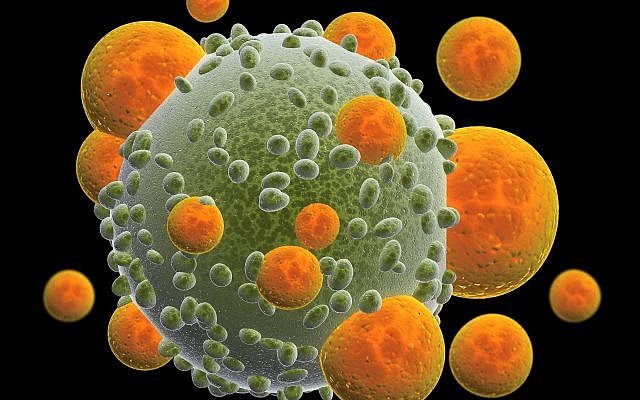Understanding role of TOX protein could pave way to restoring normal function in systems weakened by chronic disease, say researchers from Israel’s Bar-Ilan University and others.
By SHOSHANNA SOLOMON
A consortium of international researchers says it has identified a protein that is a major player in the weakening of the immune system.
The team of researchers from Germany, Switzerland, Australia, the US, and Israel, led by Prof. Dietmar Zehn of the Technological University of Munich, said that the protein they have identified, called TOX, is responsible for causing exhaustion and non-responsiveness in T cells, a group of white blood cells that play a key role in the immune system.
The primary task of the immune system is to defend the body against viruses, cancer cells and other pathogens. T cells recognize and target specific cells throughout the body that must be eliminated. They are the guardians of the body and can usually eliminate threats such as flu, chicken pox and other diseases within a few days.
Sometimes, however, infections persist over the course of several months, causing chronic diseases. It is assumed that the same goes for cancer. This puts tremendous pressure on the immune system, which on the one hand tries to actively eliminate these threats while on the other hand, also curbs its own activity so as not to cause collateral damage to healthy cells, chronic inflammation or autoimmune diseases. Thus, T cells often enter a state of exhaustion, which slows down their activity, and they fail to fully get rid of the disease the body is fighting, such as in the case of cancer.
Prof. Cyrille Cohen, a cancer immunologist at the Mina and Everard Goodman Faculty of Life Sciences at Bar-Ilan University (Courtesy)
Scientists have assumed that reversing this state of exhaustion may help re-establish proper functioning of the immune system. The 2018 Nobel Prize in Medicine was awarded to researchers James Allison and Tasuku Honjo, who discovered so-called “molecular brakes” in T cells that force them to become exhausted.
Until now, however, the general mechanisms that orchestrate this “exhaustion” have remained a mystery, the international consortium of researchers said in a statement announcing their find.
In a paper published Monday in the journal Nature, the scientists say they have clarified for the first time part of this mechanism, by identifying the TOX protein.
“Thanks to this international collaboration, we demonstrated that the protein TOX is a master regulator of exhaustion state in T cells,” said Prof. Cyrille Cohen, a cancer immunologist at the Mina and Everard Goodman Faculty of Life Sciences at Bar-Ilan University, who participated in the study. “This protein, when active in T cells, is able to drive them into a state of severe non-responsiveness.”
Cohen studied this phenomenon in human cells in a model of melanoma, successfully demonstrating a link between the expression of TOX in T cells and the generation of hypo-responsiveness, or diminished response to cancer.
The study may provide researchers with a better understanding of how T cells are repressed and help them unlock their potential in fighting chronic diseases, the scientists said in the statement.
“Now, with this information in hand we can think about how to neutralize some of these barriers so that we may restore the normal function of the immune system, even in chronic diseases, to better fight cancer or viral diseases,” Cohen said in the statement.
SOURCE: timesofisrael.com/study-ide...
